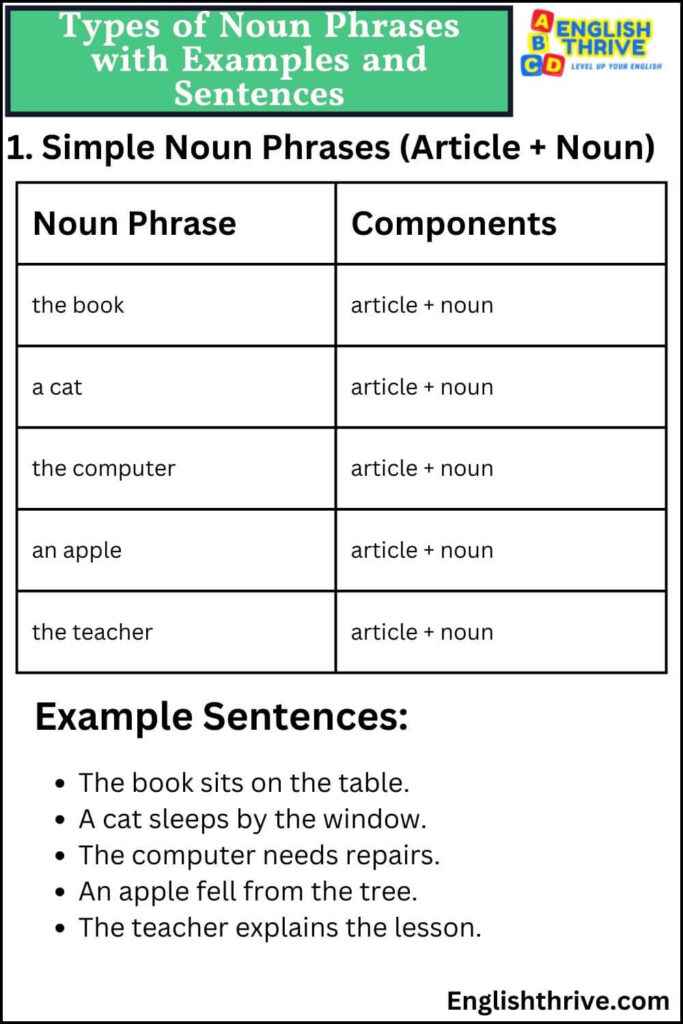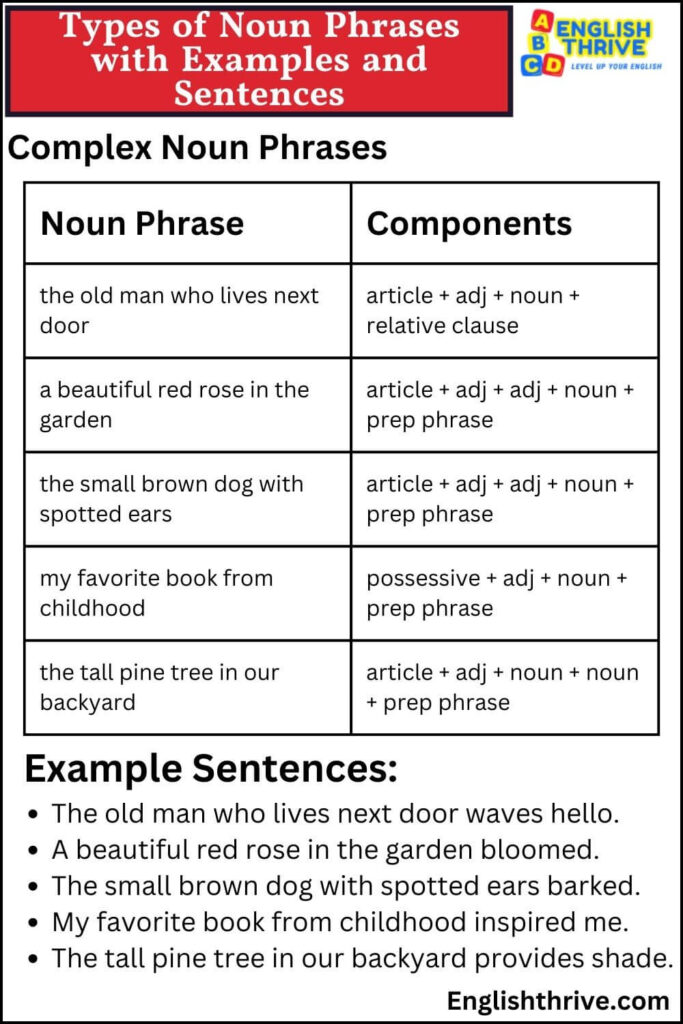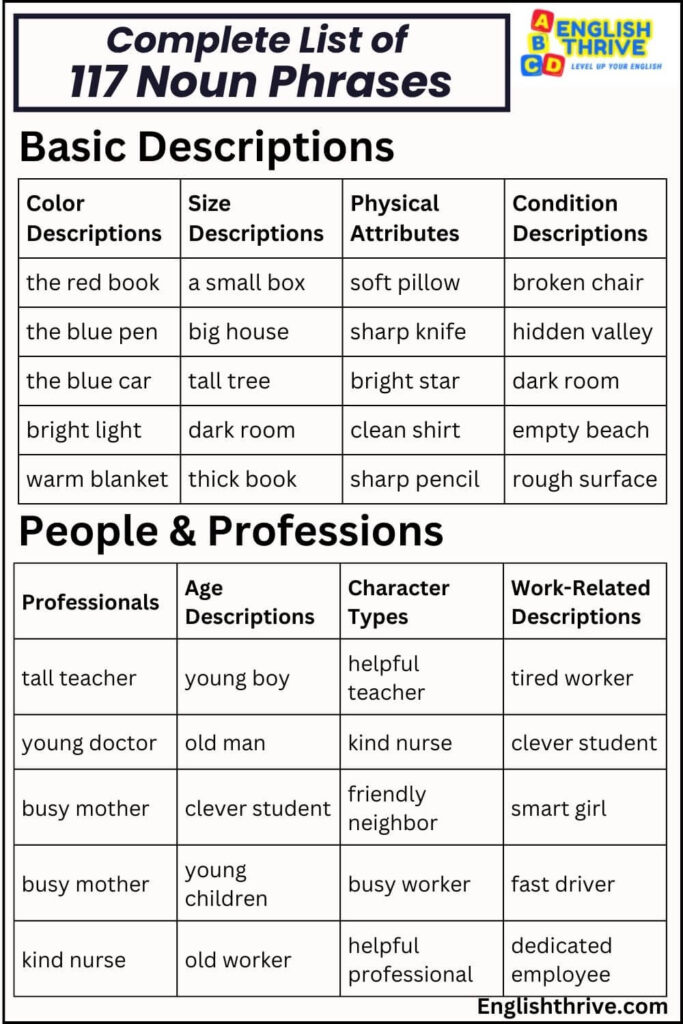Ever wondered why we say “the big blue house” instead of just “house”? That’s a noun phrase at work! As an English teacher for over a decade, I’ve found that noun phrase examples help students write more descriptively and precisely.
Let’s explore these powerful building blocks of language that make our writing more vivid and clear.
Contents
ToggleWhat Are Noun Phrases?
A noun phrase is a group of words that work together to name and describe a person, place, thing, or idea. It always contains a noun or pronoun as its main component, often accompanied by modifiers like articles, adjectives, or other descriptive words.

Types of Noun Phrases with Examples
1. Simple Noun Phrases (Article + Noun)
| Noun Phrase | Components |
|---|---|
| the book | article + noun |
| a cat | article + noun |
| the computer | article + noun |
| an apple | article + noun |
| the teacher | article + noun |
Example Sentences:
- The book sits on the table.
- A cat sleeps by the window.
- The computer needs repairs.
- An apple fell from the tree.
- The teacher explains the lesson.
2. Adjective + Noun Phrases
| Noun Phrase | Components |
|---|---|
| happy child | adjective + noun |
| tall building | adjective + noun |
| red car | adjective + noun |
| old house | adjective + noun |
| bright sun | adjective + noun |
Example Sentences:
- The happy child played in the park.
- A tall building blocks the view.
- The red car needs washing.
- An old house stands on the hill.
- The bright sun warmed the earth.
3. Multiple Adjective Noun Phrases
| Noun Phrase | Components |
|---|---|
| big blue box | adj + adj + noun |
| small white cat | adj + adj + noun |
| old wooden chair | adj + adj + noun |
| fresh green apple | adj + adj + noun |
| tall dark tree | adj + adj + noun |
Example Sentences:
- The big blue box contains toys.
- A small white cat crossed the street.
- The old wooden chair creaked.
- A fresh green apple tastes sweet.
- The tall dark tree provides shade.
4. Noun Phrases with Prepositional Phrases
| Noun Phrase | Components |
|---|---|
| book on the shelf | noun + prep phrase |
| cat in the garden | noun + prep phrase |
| house by the lake | noun + prep phrase |
| man with glasses | noun + prep phrase |
| birds in the sky | noun + prep phrase |
Example Sentences:
- The book on the shelf gathered dust.
- A cat in the garden chased butterflies.
- The house by the lake needs painting.
- The man with glasses reads the newspaper.
- Birds in the sky flew south.
5. Complex Noun Phrases
| Noun Phrase | Components |
|---|---|
| the old man who lives next door | article + adj + noun + relative clause |
| a beautiful red rose in the garden | article + adj + adj + noun + prep phrase |
| the small brown dog with spotted ears | article + adj + adj + noun + prep phrase |
| my favorite book from childhood | possessive + adj + noun + prep phrase |
| the tall pine tree in our backyard | article + adj + noun + noun + prep phrase |
Example Sentences:
- The old man who lives next door waves hello.
- A beautiful red rose in the garden bloomed.
- The small brown dog with spotted ears barked.
- My favorite book from childhood inspired me.
- The tall pine tree in our backyard provides shade.
Some different catogories Phrases:
Descriptive with Prepositions
- the book on the shelf
- a cat under the tree
- the man in the suit
- birds on the wire
- clouds in the sky
Multiple Adjectives
- the big old house
- a small red ball
- the tall dark man
- a bright young child
- the soft white clouds
With Relative Clauses
- the man who lives next door
- a book that changed my life
- the dog which barked all night
- a story we’ll never forget
- the place where we met

Complete List of 117 Noun Phrases
Basic Descriptions
| Color Descriptions | Size Descriptions | Physical Attributes | Condition Descriptions |
|---|---|---|---|
| the red book | a small box | soft pillow | broken chair |
| the blue pen | big house | sharp knife | hidden valley |
| the blue car | tall tree | bright star | dark room |
| bright light | dark room | clean shirt | empty beach |
| warm blanket | thick book | sharp pencil | rough surface |
People & Professions
| Professionals | Age Descriptions | Character Types | Work-Related Descriptions |
|---|---|---|---|
| tall teacher | young boy | helpful teacher | tired worker |
| young doctor | old man | kind nurse | clever student |
| busy mother | clever student | friendly neighbor | smart girl |
| busy mother | young children | busy worker | fast driver |
| kind nurse | old worker | helpful professional | dedicated employee |

Places & Locations
| Urban Locations | Natural Settings | Travel Destinations | Spatial Descriptions |
|---|---|---|---|
| busy street | sunny beach | distant mountain | crowded mall |
| old house | quiet park | hidden valley | small town |
| modern desk | green landscape | secret garden | busy airport |
| dusty road | early spring | late autumn | empty beach |
| sunny beach | rainy day | holiday season | next week |
Objects & Items
| Technology | Clothing | Writing Tools | Household Items |
|---|---|---|---|
| new phone | clean shirt | sharp pencil | soft cushion |
| old computer | warm blanket | thick book | heavy bag |
| new laptop | soft pillow | clean floor | broken chair |
| modern desk | clean clothing | bright light | sharp edge |
| old laptop | dark garment | rough surface | soft item |
Nature & Animals
| Wild Animals | Natural Elements | Plant Life | Sky & Weather |
|---|---|---|---|
| wild lion | gentle breeze | tall trees | flying birds |
| brown bear | green grass | baby plants | bright star |
| hungry wolf | rough surface | small plants | early spring |
| baby dolphin | soft surface | green landscape | dark night |
| small fish | green grass | crisp apple | rainy day |
Time & Events
| Daily Periods | Seasonal Moments | Special Times | Temporal Descriptions |
|---|---|---|---|
| sunny day | last summer | holiday season | perfect moment |
| morning light | early spring | special occasion | next week |
| dark night | late autumn | weekend trip | current time |
| holiday season | rainy day | next week | specific moment |
| weekend trip | early spring | perfect moment | seasonal change |
Food & Drinks
| Hot Beverages | Cold Items | Fresh Foods | Flavorful Descriptions |
|---|---|---|---|
| hot coffee | cold drink | fresh bread | spicy food |
| hot tea | cold ice cream | fresh salad | sweet cake |
| warm soup | crisp apple | ripe fruit | sweet candy |
| cold drink | fresh item | spicy food | sweet item |
| hot beverage | ripe fruit | fresh salad | crisp item |
Activities
| Physical Actions | Daily Routines | Movement | Rhythmic Motions |
|---|---|---|---|
| long walk | daily exercise | quick run | fast swim |
| hard work | quick jump | brisk jog | slow dance |
| gentle walk | hard study | fast movement | loud singing |
| quick run | daily routine | active motion | gentle motion |
| brisk jog | daily exercise | quick jump | rhythmic action |
Emotions
| Positive Feelings | Deep Emotions | Raw Feelings | Calm States |
|---|---|---|---|
| great joy | deep sadness | raw emotion | quiet contentment |
| pure happiness | deep passion | raw fear | mild anxiety |
| sweet relief | real anger | bitter regret | deep sorrow |
| high hopes | pure love | deep feeling | true emotion |
| real courage | deep understanding | raw emotion | pure bliss |
Abstract Concepts
| Intellectual | Spiritual | Personal Qualities | Philosophical |
|---|---|---|---|
| true friendship | strong faith | pure love | deep wisdom |
| clear thought | inner peace | real courage | true beauty |
| true understanding | strong belief | clear vision | real truth |
| deep knowledge | spiritual insight | pure bliss | inner strength |
| strong belief | inner peace | clear vision | deep understanding |
FAQs about Noun Phrases Examples
1. How do you identify a noun phrase in a sentence?
A noun phrase can be identified by:
- Looking for the main noun
- Finding words that modify the noun
- Checking if it can be replaced by a pronoun
- Testing if it functions as a single unit
- Seeing if it answers “what” or “who”
For example, in “The big red house,” all words work together to describe “house.”
2. What are the essential components of a noun phrase?
Essential components include:
- A head noun (mandatory)
- Determiners (articles, demonstratives)
- Pre-modifiers (adjectives)
- Post-modifiers (prepositional phrases, relative clauses)
- Complements (additional information)
3. How do noun phrases enhance writing quality?
Noun phrases enhance writing by:
- Adding specific details
- Creating vivid imagery
- Improving clarity
- Varying sentence structure
- Making descriptions more precise
- Helping avoid repetition
4. What’s the difference between simple and complex noun phrases?
The differences include:
- Structure complexity
- Number of modifiers
- Types of modifiers used
- Information conveyed
- Flexibility in usage
For example: Simple: “the book” Complex: “the old leather-bound book from my grandfather’s library”
5. How do different languages handle noun phrases?
Noun phrases vary across languages in:
- Word order
- Agreement rules
- Modifier placement
- Article usage
- Gender and number marking
This affects how we translate and learn noun phrases in different languages.
Conclusion
Understanding noun phrases is key to more descriptive and precise communication. These 117 noun phrase examples show how combining words can create rich, detailed descriptions that enhance your writing. Whether you’re a student, writer, or English learner, mastering noun phrases will help you express ideas more clearly and effectively.

